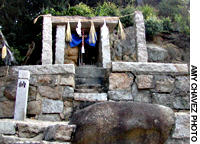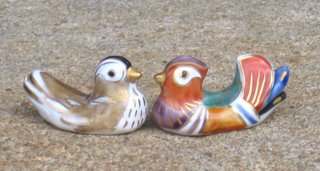:::::::::::::::::::::::::::::::::::::::::::::::::::::::::::::::::::::::::::::::::::::::::::::::::::::::::::::::::::::::::::
初詣 山の神には誰もこん
hatsu-moode yama no kami ni wa dare mo kon
First Shrine visit -
to our Mountain God
nobody comes
Gabi Greve 2004
On my daily walk -
There was a stone with the inscription 山の神, surrounded by four lage cypresse trees and in the beginning (about 10 years ago) farmers would bring a new shimenawa rope and some offerings on the second day of the New Year.
Eventually nobody came with offerings any more.
And later, when the small road was to be widened, they even cut the front two trees to get more space.
Now (in 2017) it is just an overgrown boulder with weeds, weeds and more weeds around.
dare mo kon . . . . . dare mo konai . . .
:::::::::::::::::::::::::::::::::::::::::::::::::::::::::::::::::::::::::::::::::::::::::::::::::::::
The benevolent Uncle Yama
By AMY CHAVEZ
© Japan Times, July 30, 2005
http://www.japantimes.co.jp/cgi-bin/getarticle.pl5?fl20050730cz.htm
Monday morning I awoke at 7 a.m. to chanting flowing through the window from the mountain in the back of my house. But something was strange -- the voice was not quite right. It wasn't the familiar deep voice of the priest, nor the younger voice of the priest's son. It was scratchy. Perhaps the locusts were practicing a new tune, I thought as I rolled over to go back to sleep.

Then I remembered. My neighbor Kazuko had told me that Monday was the ceremony for the mountain god. As the scratchy voice was joined with a chorus of more familiar neighborly voices, I jumped out of bed and ran to the ceremony. Still fighting off sleep, I was welcomed with a small bowl of sake. That's one hell of a way to wake up in the morning -- an alcoholic alarm clock. It worked, anyway.
Although I had missed the ceremony, I still went up and said a prayer to the mountain god at his designated shrine in the side of the mountain and left a 1,000 yen note between the dead fish and the "kagami mochi" laid out in front. As it would be bad form to leave exposed money as an offering, I put my bill into one of those fancy envelopes like the Japanese do, which is nice because it makes it look like there must be much more than just 1,000 yen inside. I've always thought this was a strange tradition, though. After all, what is the mountain god going to do with the money?
Then I came down from the shrine and joined my neighbors eating fried shrimp, dried fish and dried squid. Then I drank a beer and another beer, all before 9 a.m. This is not the breakfast of champions, I'll admit, but it is breakfast with the gods -- the Shinto version of having breakfast with Santa Claus.
Shinto is a religion that combines alcohol and a life-long series of ceremonies to thank gods for taking care of us. Japanese sake is a sacred offering to the gods. Each of the eight neighborhoods on our island has one special Shinto god they take care of. Ours is the mountain god, and this ceremony is put on by our neighborhood twice a year. I've become fond of the mountain god over the years and refer to him as Uncle Yama, always looking over me and protecting me. And he seems to be doing a good job. Last year, my house and Kazuko's were the only houses on the port that didn't get damaged by typhoons.
Some Westerners suggest that all these Shinto ceremonies are just another excuse for a party. I disagree. It's more basic than that. And it's not merely to sit around eating fried shrimp and spending time with the neighbors and Uncle Yama either. Shinto ceremonies help keep everyone in business. You see, once all the envelopes were collected and the money counted, no one gave it to Uncle Yama. Instead, a neighbor left on a bicycle with the money in his pocket. He was going around to pay all the businesses: the liquor store for the two bottles of sake we drank, the fishermen's co-op where we bought the fish for the ceremony and the ice to keep the beer cold, and the supermarket -- which got my 1,000 yen bill -- where we bought the fried shrimp and dried fish and squid. Everything for the ceremony was bought from different stores on the island, and not one business was left out.
The Japanese were doing what they do best -- continuing a long tradition of self-sufficiency while also helping out their neighbors. And Uncle Yama's role was to bring us together as a community.
Usually, we would pay a priest too, for coming to lead the ceremony. But this year, due to the declining population of our neighborhood, we didn't have enough people to contribute to a priest.
"So, who was that with the scratchy voice chanting the sutras this morning?" I asked my neighbors. "Oh, that was a recording," they said.
Amy Chavez
:::::::::::::::::::::::::::::::::::::::::::::::::::::::::::::::::::::::::::::::::::::::::::::::::::::
. Yama no Kami 山の神 God of the Mountain .
- Introduction -
:::::::::::::::::::::::::::::::::::::::::::::::::

. Join the Updates of Facebook ! .
:::::::::::::::::::::::::::::::::::::::::::::::::::::::::::::::::::::::::::::::::::::::::::::::::::::
[ . BACK to DARUMA MUSEUM TOP . ]
[ . BACK to WORLDKIGO . TOP . ]
:::::::::::::::::::::::::::::::::::::::::::::::::::::::::::::::::::::::::::::::::::::::::::::::::::::








No comments:
Post a Comment